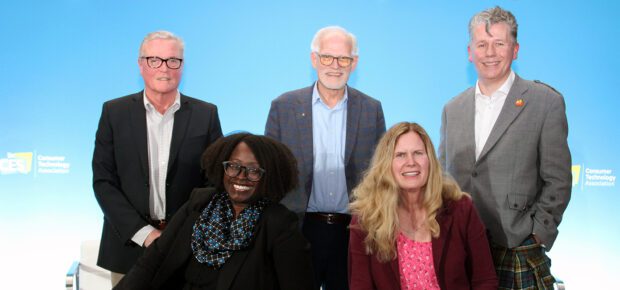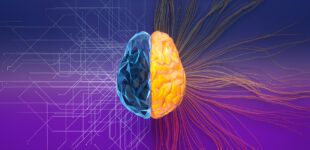January 19, 2024
The nature of work is evolving at an unprecedented pace. The rise of generative AI has accelerated data analysis, expedited the production of software code and even simplified the creation of marketing copy.
Those benefits have not come without concerns over job displacement, ethics and accuracy.
At the 2024 Consumer Electronics Show (CES), IEEE experts from industry and academia participated in a panel discussion discussing how the new tech landscape is changing the professional world, and how universities are educating students to thrive in it.
Check out a full version of the panel here, hosted by 2024 IEEE President Tom Coughlin.
Here are highlights of the lively discussion.
Human in the Loop
One of the big debates in the field of AI is whether it will ever be appropriate for autonomous systems to operate without human oversight, especially when those systems can have unforeseen and unintended consequences. Autonomous systems are increasingly used in situations where human lives could be at stake, such as driving, or where jobs could be impacted, such as in hiring new employees.
“Truly, I don’t believe that AI should be fully automated without a human in the loop doing some checking,” said IEEE Member Gloria Washington, whose research focuses on human-centered and affective computing.
AI Hallucinations May Limit Usefulness
Kayne McGladrey, IEEE Senior Member, noted that the use of generative AI models in business hinges on their ability to provide accurate information. He cited as examples studies of AI models’ abilities to extract information from documents used for financial sector regulation that are frequently relied on to make investment decisions.
“Right now, the best AI models get 80 percent of the questions right,” McGladrey said. “They hallucinate the other 20 percent of the time. That’s not a good sign if you think you are making investment decisions based on artificial intelligence telling you this is a great strategy four out of five times.”
Emerging Ethical Codes
IEEE President-Elect Kathleen Kramer noted that IEEE created the world’s first engineering ethics code in 1912, and for over a century has continued to work as an organization to update codes of professional conduct in engineering, computer science and the emerging field of AI ethics.
“Traditional engineering ethics is about lives being at stake and caring about the public,” Kramer said. “Computer science ethics didn’t evolve from the same space. There, the concern is about property, privacy and security. In artificial intelligence, you need to bring them together.”
AI and Professional Ethics
As industries increasingly turn to artificial intelligence to enhance productivity and decision-making, concerns about ethical implications have arisen.
Jim Doty, a science fiction writer and IEEE member, noted that industries with strong ethical codes may face limitations when it comes to integrating AI into their work.
“Attorneys have an ethical obligation that they will serve their client,” Doty said. “The AI
company has no such obligation.”
In some fields, Doty said, like medicine and healthcare, AI may be limited as a core part of decision-making and have to work on the periphery.
Who Gets to Comment?
Ultimately, Washington said, the rise of AI will have implications for broad sections of society, making it critical to have a debate that matches the scope of those impacts.
“People believe that you have to be an AI expert to comment,” Washington said. “That should not be, because we are all stakeholders.”
Learn more: Interested in going in-depth on the implications of AI design? Check out “Ethically Aligned Design” from the IEEE Standards Association. This in-depth look at the use of artificial intelligence to improve human wellbeing is available in several languages.






 Meaningful Momentum or Running in Place?
Meaningful Momentum or Running in Place? AI Through Our Ages
AI Through Our Ages Liquid Infrastructure: Our Planet's Most Precious Resource
Liquid Infrastructure: Our Planet's Most Precious Resource The Impact of Technology in 2025
The Impact of Technology in 2025 Quantum and AI: Safeguards or Threats to Cybersecurity?
Quantum and AI: Safeguards or Threats to Cybersecurity? Why AI Can't Live Without Us
Why AI Can't Live Without Us Bits, Bytes, Buildings and Bridges: Digital-Driven Infrastructure
Bits, Bytes, Buildings and Bridges: Digital-Driven Infrastructure Impact of Technology in 2024
Impact of Technology in 2024 Emerging AI Cybersecurity Challenges and Solutions
Emerging AI Cybersecurity Challenges and Solutions The Skies are Unlimited
The Skies are Unlimited Smart Cities 2030: How Tech is Reshaping Urbanscapes
Smart Cities 2030: How Tech is Reshaping Urbanscapes Impact of Technology 2023
Impact of Technology 2023 Cybersecurity for Life-Changing Innovations
Cybersecurity for Life-Changing Innovations Smarter Wearables Healthier Life
Smarter Wearables Healthier Life Infrastructure In Motion
Infrastructure In Motion The Impact of Tech in 2022 and Beyond
The Impact of Tech in 2022 and Beyond Cybersecurity, Technology and Protecting Our World
Cybersecurity, Technology and Protecting Our World How Technology Helps us Understand Our Health and Wellness
How Technology Helps us Understand Our Health and Wellness The Resilience of Humanity
The Resilience of Humanity Harnessing and Sustaining our Natural Resources
Harnessing and Sustaining our Natural Resources Creating Healthy Spaces Through Technology
Creating Healthy Spaces Through Technology Exceptional Infrastructure Challenges, Technology and Humanity
Exceptional Infrastructure Challenges, Technology and Humanity The Global Impact of IEEE's 802 Standards
The Global Impact of IEEE's 802 Standards Scenes of our Cyber Lives: The Security Threats and Technology Solutions Protecting Us
Scenes of our Cyber Lives: The Security Threats and Technology Solutions Protecting Us How Millennial Parents are Embracing Health and Wellness Technologies for Their Generation Alpha Kids
How Millennial Parents are Embracing Health and Wellness Technologies for Their Generation Alpha Kids Space Exploration, Technology and Our Lives
Space Exploration, Technology and Our Lives Global Innovation and the Environment
Global Innovation and the Environment How Technology, Privacy and Security are Changing Each Other (And Us)
How Technology, Privacy and Security are Changing Each Other (And Us) Find us in booth 31506, LVCC South Hall 3 and experience the Technology Moon Walk
Find us in booth 31506, LVCC South Hall 3 and experience the Technology Moon Walk Virtual and Mixed Reality
Virtual and Mixed Reality How Robots are Improving our Health
How Robots are Improving our Health IEEE Experts and the Robots They are Teaching
IEEE Experts and the Robots They are Teaching See how millennial parents around the world see AI impacting the lives of their tech-infused offspring
See how millennial parents around the world see AI impacting the lives of their tech-infused offspring Take the journey from farm to table and learn how IoT will help us reach the rising demand for food production
Take the journey from farm to table and learn how IoT will help us reach the rising demand for food production Watch technical experts discuss the latest cyber threats
Watch technical experts discuss the latest cyber threats Explore how researchers, teachers, explorers, healthcare and medical professionals use immersive technologies
Explore how researchers, teachers, explorers, healthcare and medical professionals use immersive technologies Follow the timeline to see how Generation AI will be impacted by technology
Follow the timeline to see how Generation AI will be impacted by technology Learn how your IoT data can be used by experiencing a day in a connected life
Learn how your IoT data can be used by experiencing a day in a connected life Listen to technical experts discuss the biggest security threats today
Listen to technical experts discuss the biggest security threats today See how tech has influenced and evolved with the Games
See how tech has influenced and evolved with the Games Enter our virtual home to explore the IoT (Internet of Things) technologies
Enter our virtual home to explore the IoT (Internet of Things) technologies Explore an interactive map showcasing exciting innovations in robotics
Explore an interactive map showcasing exciting innovations in robotics Interactively explore A.I. in recent Hollywood movies
Interactively explore A.I. in recent Hollywood movies Get immersed in technologies that will improve patients' lives
Get immersed in technologies that will improve patients' lives